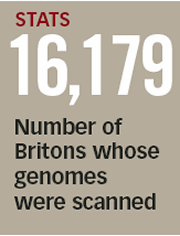Guilt by Association: Whole-genome scans yield disease clues
In a sweeping demonstration of the power of the new biology, researchers have linked two dozen genetic variations to six major diseases.

The study, which scanned the genomes of 16,179 British citizens, is “unprecedented in scope and scale,” says Anne Bowcock of the Washington University School of Medicine in St. Louis.
The research promises to speed fundamental understanding of bipolar disorder, coronary artery disease, the digestive disorder called Crohn’s disease, rheumatoid arthritis, and type 1 and type 2 diabetes. It will also accelerate new-drug development, say scientists.
“For most of these diseases, we know very little about the biological processes involved,” says Peter Donnelly, a statistician at the University of Oxford in England and head of the consortium of 50 research groups that describe the study in the June 7 Nature. “This gives us a whole new foothold.”
The large study leveraged years of work cataloging genetic differences among individuals. The human genome contains 3 billion letters, or nucleotides, 6 to 8 million of which vary from one individual to another. This genetic diversity accounts for many differences in susceptibility to particular diseases. A recently completed international project called the HapMap highlighted the 500,000 most significant variations.
Using the HapMap, a California company called Affymetrix made a chip that can quickly identify which nucleotide a person carries at each of the 500,000 key locations. The chip, a piece of plastic about the size of a standard microscope slide, sells for a few hundred dollars.
By comparing the pattern of those key nucleotides in healthy people with the patterns in people with disease, the researchers uncovered 24 variations that herald increased risk: One variation is tied to bipolar disorder; one to coronary artery disease; nine to Crohn’s disease; three to rheumatoid arthritis; seven to type 1 diabetes; and three to type 2 diabetes.
“Each of these genetic markers comes in two forms. If one form is more common in patients with the disease, that tells you there is a disease gene nearby,” says Bowcock.
The report underscores the genetic complexity of many common diseases. In rare diseases such as Huntington’s and cystic fibrosis, every person inheriting a single bad gene gets sick. But in the diseases tackled by the British group, many different genetic variations make small contributions.
Some of the variants lie within known genes, making those genes prime suspects. Others lie in “genomic deserts,” where their function remains a mystery. In either case, unraveling the underlying biological processes will require “going back to the bench,” says Bowcock.
That task should be easier now. Scientists say that the new data will enable them to find disease genes swiftly. In fact, companion research published simultaneously in Nature Genetics does just that. Building on the large study led by Donnelly, a team led by Miles Parkes at the University of Cambridge in England identified genes involved in Crohn’s disease. These genes promote actions that help expel bacteria from cells in the gut, and if the genes go awry, the bugs can linger. “We’ve long thought bacteria were important to Crohn’s disease, but we never knew why,” says Parkes. “This is a major insight.”
Researchers expect that many more insights will rapidly follow.







